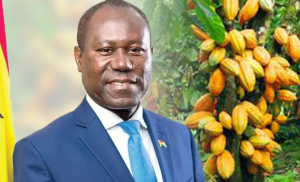The current shortage of cocoa in Ghana and Cote d’Ivoire for international market supply, and its resultant low pricing, is creating suspicions of global cocoa and chocolate traders’ deliberate attempts to perpetually keep the price of the commodity at its lowest, COCOBOD CEO Joseph Boahen Aidoo has said.
He said the COVID-19 pandemic resulted in a natural surplus of cocoa in both Ghana and Ivory Coast for 2021, which kept prices lower, adding: “As we speak, there is a huge shortage of the commodity in both countries for supply; but still, prices are down. When there is a surplus, prices are down; when there is a deficit, prices remain low.
“These occurrences are baffling and we must interrogate them. This also informs us that there is some kind of deliberate attempts and schemes to keep the prices down by global actors,” Mr. Boahen Aidoo indicated.
The CEO was addressing senior cocoa value chain actors, multinational companies in cocoa trade and key stakeholders at a meeting hosted by the Cote d’Ivoire-Ghana Cocoa Initiative in Accra to deliberate on sustainable solutions for a more thriving cocoa industry with a focus on Living Income Differential (LID) and country premiums.
“We have to look for a more thriving and sustainable industry to bring into focus the farmer who is at the centre-stage of production,” he said.
Challenges with LID and premiums
For the past 20 years, the industry has been concerned about the welfare of farmers – whereon a number of initiatives including certification and sustainability programmes were all geared toward improving the condition of farmers.
However, these programmes were not enough because they were touching just a section of farmers in Ghana; less than 20 percent of farmers were involved in these sustainability programmes.
In a bid to further cushion cocoa farmers, COCOBOD introduced the LID four years ago to increase the incomes of farmers and help them achieve a living income of US$400 per tonne above the floor price.
But the LID initiative, according to Mr. Boahen, is currently yielding minimal impacts – describing it as a mirage.
The price of cocoa was around US$3,000 in 2016 but has currently fallen in the range of US$2,000 per tonne, which has become a disincentive for farmers to continue being at the centre of production and supply.
Due to these happenings, COCOBOD since 2019 commenced subsidising almost US$200million of cocoa production, with the amount currently rising to US$400million a year for production as of 2021 to enable Ghanaian farmers to stay on course.
Mr. Boahen Aidoo disclosed that though the industry has paid a premium for the quality of cocoa produced over the years, these premiums are currently being discounted and creating a disheartening situation.
“Once the premium is discounted, it automatically means all quality must be removed from the equation when the farmer is bringing cocoa to the regulator. But this is not the case,” he said.
Current premiums on cocoa, COCOBOD said, go below zero for the origin – where it sometimes stands at -50 and -120.
Once the origin is discounted, it becomes difficult for Ghana and Cote d’Ivoire to make enough to pay farmers, Mr. Boahen noted, adding: “This makes the whole idea of LID a mirage, as premiums plunge and farmers suffer the consequences of a price drop”.
Additional challenges confronting production
Indeed, cocoa farmers in Ghana have been battling with other challenges which the regulator fears might force them to give up on the commodity’s production.
Challenges such as the sale of land by cocoa farmers for illegal mining activities still persist. Others include competition with cashew and rubber production – COCOBOD has said the latter is very dominant and thriving.
“So with all this competition, the farmer without any motivation of fair pricing will be forced to give up the land for use by the above-mentioned activities. Once the farmer is weakened, the entire chain breaks down,” the COCOBOD chief said.
Executive Secretary of the Cote d’Ivoire-Ghana Cocoa Initiative, Alex Arnaud Assanvo, said the need to always prioritise farmers must always be at the heart of all discussions in the value chain.
He pledged Ghana and Cote d’Ivoire’s commitment to ensuring that the quality of cocoa beans is a necessity for the global market.
The CEO of global cocoa trader Touton, Patrick De Boussac – who was at the meeting, said value chain actors seek the industry’s growth.








